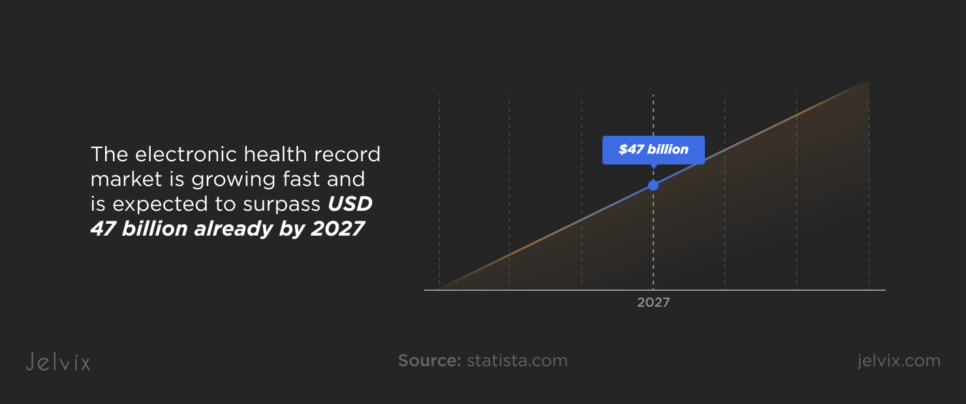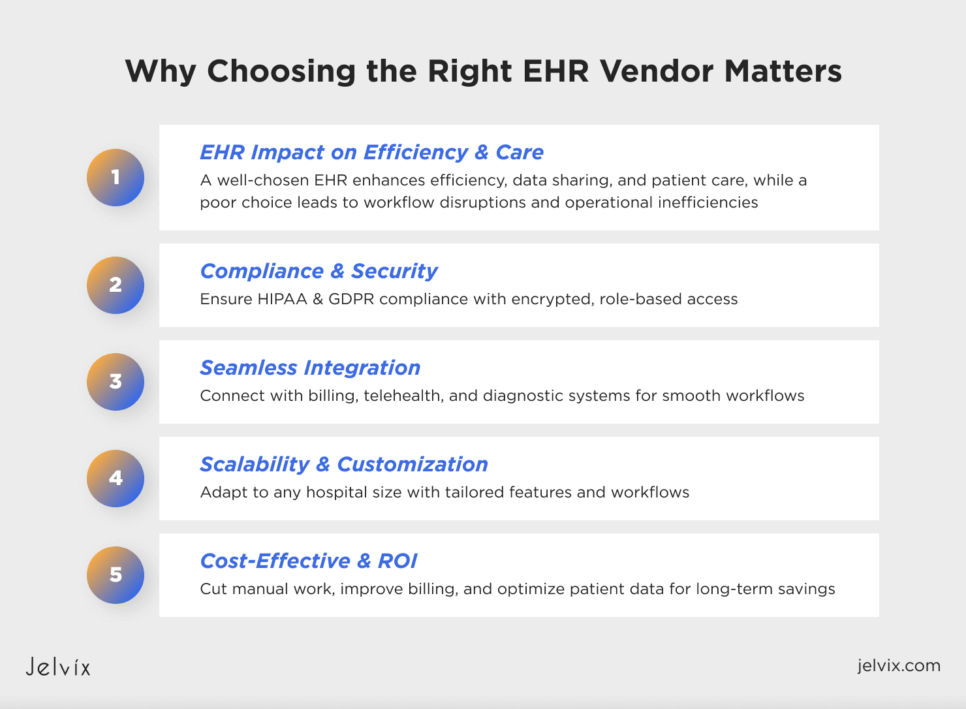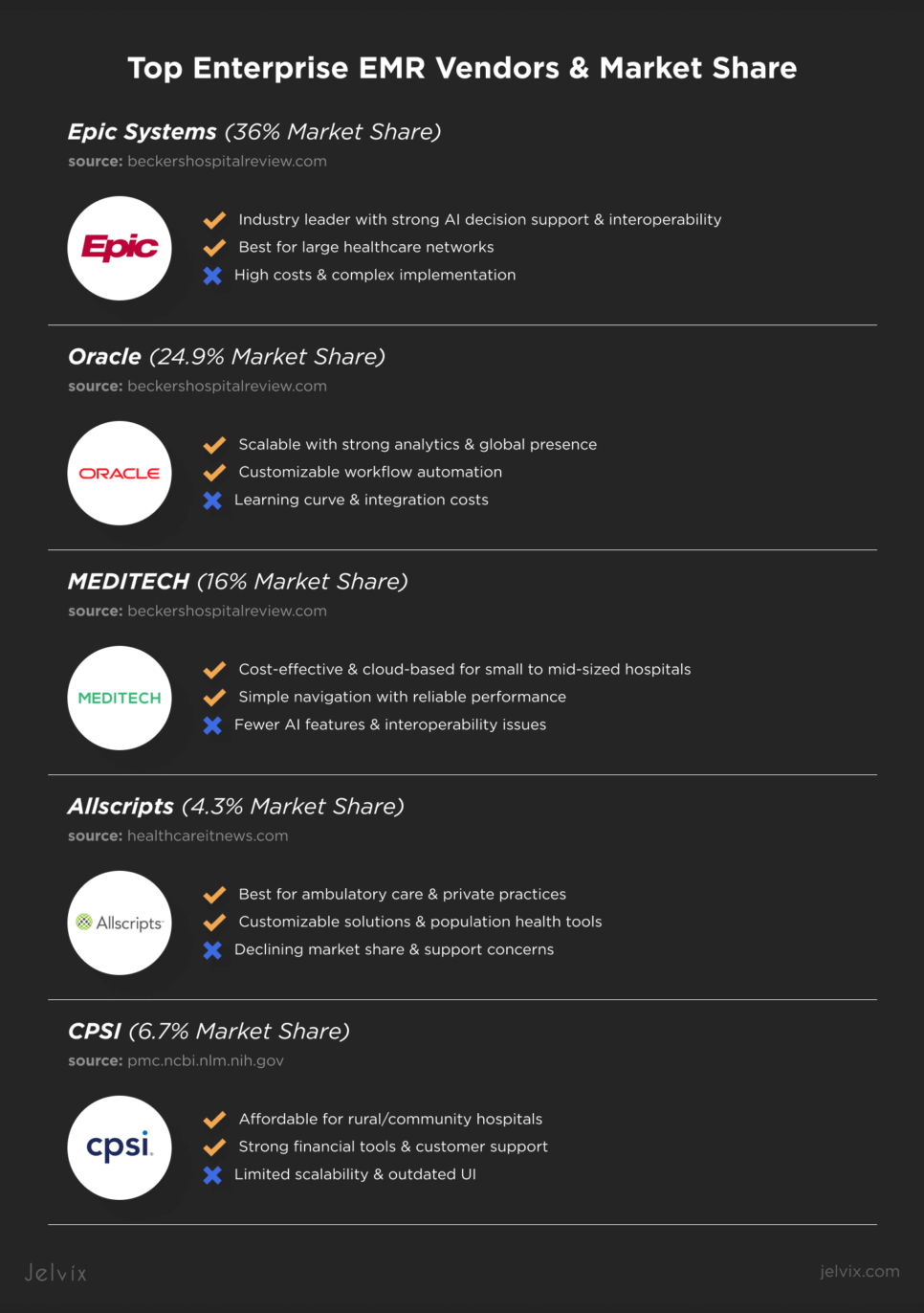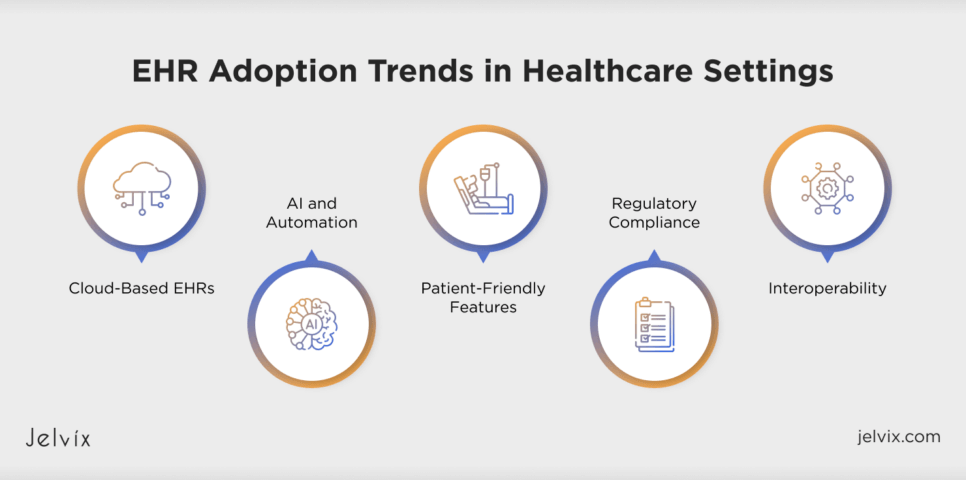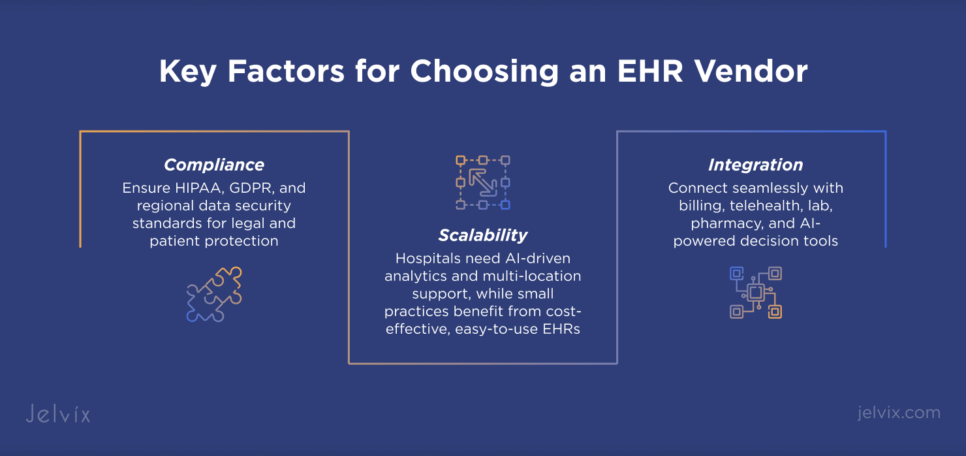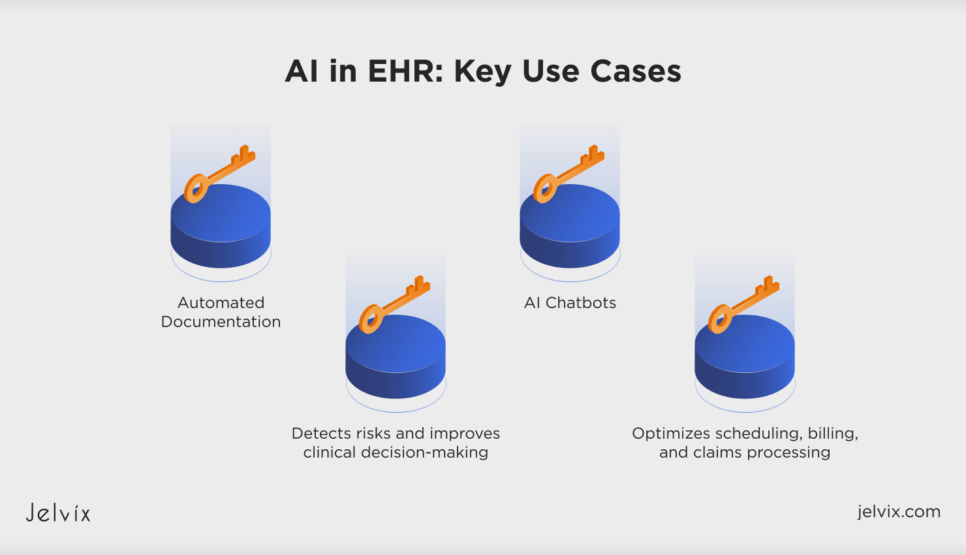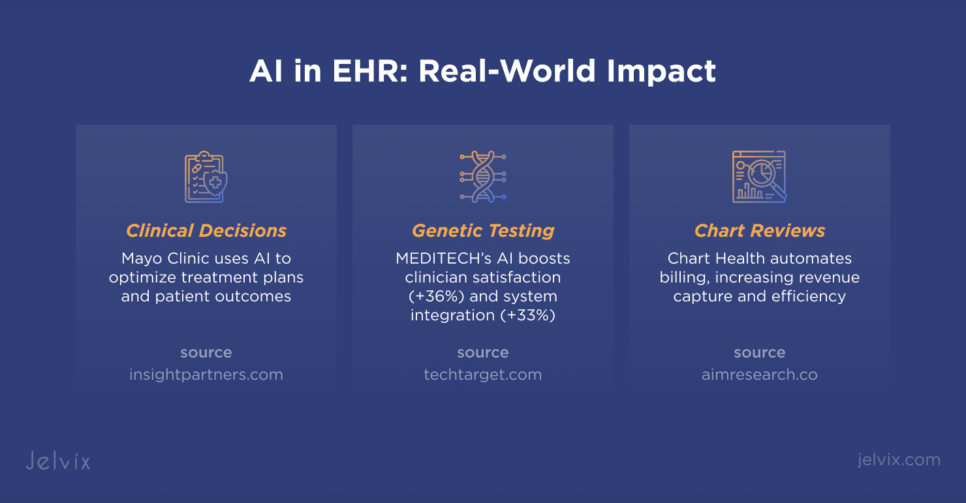The electronic health record market is growing fast and is expected to surpass USD 47 billion already by 2027. Although it is large and competitive, with numerous solutions for diverse needs, choosing the right one can be pretty challenging.
Wrong choices can easily lead to operational inefficiencies, critical mistakes, and revenue losses. What’s more, an incorrect EHR solution can compromise patient care and severely impact your clinic’s reputation.
If you want to know which of the largest EMR vendors can truly support your business needs, read this article. You’ll learn more about the benefits and challenges of the market key players, how they use AI to impact the future of healthcare tech, and the main factors to consider when choosing a vendor for your enterprise.
Implementation of EMR Systems Across Various Countries
Medical enterprises around the globe use EHR implementation to modernize their operations and enhance patient care. However, their adoption varies by country due to regulatory differences, infrastructure readiness, and healthcare system structures.
EHRs have evolved from simple record-keeping to advanced systems powered by AI and big data. As a result, the EHR market in North America will likely hit USD 17.34 billion by 2030.
In Europe, 100% of member states provided some form of online access to health data for patients at the end of 2023. The biggest improvements were seen in France, Portugal, Slovakia, and Germany.
Why Choosing the Right EHR Vendors for Hospitals Is Critical
Choosing the right EHR vendor is important because it affects how smoothly your hospital runs and how well patients are cared for. The right system makes data sharing easier and helps doctors make better decisions, while an incorrect EHR can become a source of continuous operational errors.
Compliance and Security
A top-tier EHR vendor guarantees HIPAA, GDPR, and regional healthcare compliance, ensuring secure data encryption, role-based access, and audit trails to protect patient records.
Interoperability and Integration
The right EHR seamlessly connects with billing systems, telehealth platforms, pharmacy networks, and diagnostic tools, ensuring efficient workflows and smooth data exchange between providers.
Scalability and Customization
A flexible EHR can adapt to the needs of small clinics, multi-location hospitals, and expanding enterprise networks, allowing custom features, role-specific workflows, and specialty care adaptations.
Cost-Effectiveness and ROI
Investing in a future-proof EHR minimizes long-term costs by reducing manual work, improving billing accuracy, and improving patient data management, ultimately enhancing profitability and patient satisfaction.
Top Vendors of Enterprise EMR Systems by Market Share
Several big players dominate the EHR market, although many more trustworthy EHR tools can suit the diverse needs of healthcare practices.
Epic Systems
As of 2023, Epic holds approximately 36% market share of hospitals in the U.S. It is well-suited for large healthcare organizations seeking a robust and all-encompassing EHR solution. Smaller practices should carefully assess their financial and technical capacities before implementing Epic.
Key benefits of Epic:
- Industry leader with extensive interoperability;
- Customizable for large healthcare networks;
- Strong AI-powered decision support tools;
- Advanced patient engagement features.
Main drawbacks:
- High implementation cost, making it less accessible for small practices;
- Complex implementation, requiring significant IT resources;
- Limited flexibility for smaller and specialized clinics.
Oracle
Oracle Cerner accounts for about 24.9% of the acute care hospital EHR market in the U.S. Oracle is ideal for organizations prioritizing data analytics and scalability. Prospective users should plan for comprehensive training and potential customization efforts.
Top benefits of Oracle:
- Scalable for hospitals and outpatient settings;
- Strong population health and data analytics;
- Customizable workflow automation tools;
- Established presence in global markets.
Key drawbacks:
- Tangible learning curve for new users;
- Declining market share and recent performance issues;
- Higher costs for customization and integration.
MEDITECH
MEDITECH holds approximately 16% of the acute care hospital EHR market in the U.S. It is suitable for small to medium-sized healthcare providers seeking a cost-effective and integrated EHR solution. Providers should evaluate their need for advanced features and assess interoperability requirements.
Key benefits of MEDITECH:
- Cost-effective for small to mid-sized hospitals;
- User-friendly interface with simple navigation;
- Strong cloud-based options for easy access;
- Reliable performance with minimal downtime.
Top drawbacks:
- Fewer advanced AI features;
- Interoperability challenges with third-party software;
- Limited customization compared to larger vendors.
Allscripts
Allscripts, now Veradigm, holds about 4.3% of the ambulatory EHR market. It is a viable option for healthcare providers seeking flexible solutions focused on population health. Potential users should assess integration capabilities and seek comprehensive support during implementation.
Main benefits include:
- Strong focus on ambulatory care and private practices;
- Customizable solutions for various specialties;
- Good analytics and population health management tools;
- Flexible pricing for different provider sizes.
Key drawbacks:
- Declining market share, raising concerns about long-term viability;
- Integration challenges with certain third-party systems;
- Unclear user satisfaction with complaints about customer support.
CPSI (TruBridge)
CPSI, rebranded as TruBridge, represents approximately 6.7% of the acute care hospital EHR market in the U.S. It is well-suited for small and, even rural hospitals seeking an affordable EHR solution. You need to consider your specific feature requirements and evaluate the user interface to ensure CPSI meets your operational needs.
The top benefits are:
- Tailored for rural and community hospitals;
- Affordable pricing with strong financial management tools;
- Simple, easy-to-use interface for small teams;
- Good customer support for smaller facilities.
Main drawbacks:
- Lacks advanced AI features found in larger vendors;
- Scalability limitations for growing healthcare networks;
- Outdated user interface compared to competitors.
Other EMR Software Companies
Several other EHR vendors cater to small and mid-sized practices, offering cost-effective and specialized solutions:
- eClinicalWorks provides affordable and cloud-based EHR with telehealth and billing tools, though some users report customer support issues;
- NextGen Healthcare specializes in ambulatory and specialty care, with strong analytics but a less intuitive interface;
- Greenway Health offers an easy-to-use EHR with solid customer support, though it lacks scalability for larger systems;
- Athenahealth is good in billing and revenue cycle management, but its subscription pricing can be high for small practices.
The Best EHR Software: Market Share Breakdown
The EHR/EMR market experienced significant growth and failure. Analyzing key trends and challenges in EHR adoption can help you understand what solution will suit your specific needs best.
Explore the pros and cons of custom EHR software vs. off-the-shelf solutions to choose what’s best for your practice.
Trends in EHR Providers Adoption Across Healthcare Settings
EHR adoption is changing as healthcare providers seek better efficiency, compliance, and patient care.
Cloud-Based EHRs
More providers are switching to cloud-based EHRs for easier access, lower costs, and better scalability, especially in small clinics and multi-location practices.
AI and Automation
EHRs now include AI-powered tools like predictive analytics, voice recognition, and automation to help doctors make faster decisions and reduce paperwork.
Interoperability
Healthcare providers need EHRs that seamlessly connect with labs, pharmacies, billing systems, and telehealth platforms. That’s why they choose EHR integration API options like FHIR and HL7.
Regulatory Compliance
Hospitals and clinics choose EHRs that meet HIPAA, GDPR, and other security standards to protect patient data and avoid legal risks.
Patient-Friendly Features
Telehealth, mobile access, and secure messaging are now must-have features, as they help providers engage patients and improve care delivery.
Major Failures in EHR Adoption Worldwide
Despite the benefits of EHRs, some major implementations failed due to poor planning, lack of training, and technical issues.
For instance, Cambridge University Hospitals spent £200 million on an Epic EHR system. After launch, system crashes and workflow disruptions delayed emergency care. Poor staff training and lack of testing caused critical inefficiencies, leading to leadership resignations.
Another example is Nanaimo Regional General Hospital in British Columbia which rolled out Cerner EHR for $230 million. However, software bugs and inefficient workflows caused delays in patient care. A lack of proper planning and staff involvement worsened adoption struggles.
What Providers Can Learn from Working with Wrong EMR Companies
As you can see, integration with EHR systems can fail without proper planning, training, and user engagement. However, you can avoid common pitfalls by learning from these backslides.
Involve End Users Early
Engage doctors, nurses, and administrators in the planning phase to ensure the system aligns with real-world workflows and minimizes resistance.
Invest in Training
Provide hands-on training sessions, user guides, and ongoing support to help staff navigate the new system effectively.
Conduct Testing
Launch pilot in a controlled environment before full deployment to identify and resolve technical issues before they disrupt patient care.
Ensure Strong Vendor Support
Work with an EHR provider that offers 24/7 technical support, system customization, and troubleshooting for a smoother transition.
Plan for Contingencies
Have a backup system and emergency response plan to avoid service disruptions in case of technical failures.
Key Factors for Choosing an EHR Vendor
Choosing the right EHR/EMR vendor will affect your workflow efficiency, patient care, and long-term adaptability. Consider key factors like scalability, compliance, and integration possibilities of your future EHR system before adopting it.
Scalability for Hospitals vs Small Practices
Healthcare facilities have different needs, so the EHR system should be flexible enough to scale with their growth.
Hospitals and enterprise networks require EHRs with multi-location support, AI-driven analytics, and interoperability with third-party systems. Small practices and clinics will benefit from a cost-effective and easy-to-use EHR with features like automated documentation, simple billing, and telehealth.
Compliance with Industry Regulations
EMR vendors must meet strict data privacy and security standards to ensure patient information is protected and legally compliant:
- HIPAA ensures secure patient data storage, encrypted communications, and controlled access for compliance with U.S. laws;
- GDPR requires strict patient consent management, right-to-access features, and data protection policies for compliance in the EU;
- Regional regulations may have additional compliance needs, such as 42 CFR Part 2 (substance abuse records) or PIPEDA (Canada).
Integration Capabilities with Existing Systems
An effective EHR workflow means the system seamlessly connects with other software used in healthcare operations to improve data flow and reduce manual work.
Billing and Revenue Cycle Management
Your EHR should integrate well with insurance claims processing, payment gateways, and financial tools to improve revenue tracking.
Telehealth and Remote Care
It must support video conferencing, remote monitoring devices, and secure patient communication tools for better accessibility and connection of patients with their doctors.
Lab and Pharmacy Systems
Ensure your EHR supports fast test result sharing, prescription management, and medication tracking to improve patient care.
AI and Decision Support Tools
It also must enable predictive analytics, clinical alerts, and workflow automation to enhance decision-making.
The Role of AI in EMR/EHR Platforms
AI-powered EHR tools can help reduce the administrative burden on staff, enhance clinical decision-making, and improve patient outcomes.
AI-Powered Clinical Documentation
AI improves documentation management by automatically transcribing doctor-patient interactions, summarizing key details, and structuring clinical notes. Natural language processing allows AI to extract relevant medical information, reducing manual data entry and improving data accuracy.
AI-Driven Diagnostics and Decision Support
AI enhances clinical decision-making by analyzing patient data, identifying risk factors, and suggesting personalized treatment options. Machine learning algorithms help detect early signs of diseases, improve diagnostic accuracy, and reduce human error.
Automating Administrative Tasks
AI simplifies scheduling, medical billing, and claims management by predicting appointment no-shows, processing insurance claims, and detecting errors in financial transactions. This helps providers reduce paperwork, improve cash flow, and minimize administrative workload.
AI Agents and Chatbots
AI-powered chatbots and virtual assistants can help improve patient engagement and operational efficiency. They can easily handle appointment scheduling, medication reminders, patient inquiries, and symptom assessments.
To implement AI agents effectively, you need to train them on real data like historical patient interactions and clinical guidelines. They should work alongside EHR, telehealth, and billing systems for a unified experience. What’s more, AI chatbots must follow HIPAA, GDPR, and healthcare privacy regulations to prevent ethical and operational issues.
AI-Enabled EHR Solutions: Real-World Case Studies
Leading EHR vendors are increasingly integrating AI to enhance healthcare delivery. Learning from successful cases can help you understand how AI can be useful for your medical practice.
Enhancing Genetic Testing
MEDITECH’s Expanse Genomics solution uses AI to simplify the ordering and processing of genetic tests. User satisfaction surveys showed a 36% increase in clinician satisfaction with choosing therapies and clinical trials and a 33% improvement in how well these selection tools were integrated into the system.
Improving Clinical Decision-Making
Mayo Clinic integrated AI into its EHR system to enhance clinical decision-making. By analyzing vast amounts of patient data, AI tools assist in identifying optimal treatment plans and predicting patient outcomes. This approach improved operations and the quality of care provided to patients.
Automating Chart Reviews
Charta Health, a healthcare AI startup, developed a platform that automates patient chart reviews. Their AI technology identifies missed codes and flags issues before billing, improving revenue capture for providers. This solution led to early profitability and significant interest from healthcare providers seeking to optimize operations.
Get a complete guide to choosing the right cloud-based EHR system for your healthcare practice.
Future Trends in EHR and AI Integration
In addition to all the benefits it offers to providers right now, AI also has the potential to make healthcare more predictive, connected, and personalized.
Predictive Analytics for Patient Care
AI can analyze patient history, symptoms, and risk factors to predict disease progression, hospital readmissions, and treatment outcomes. This allows doctors to intervene earlier and provide better care.
Interoperability and Data Standardization
Healthcare providers use different EHR systems, which can lead to data silos. AI-driven FHIR-based interoperability enables seamless data sharing between hospitals, labs, and pharmacies, improving care efficiency and coordination.
Personalized Medicine with AI-Driven Insights
AI can analyze genetic data, lifestyle, and medical history to create custom treatment plans for each patient. This can reduce trial-and-error treatments and improve health outcomes with targeted therapies.
How Jelvix Helps Enhance Clinical Operations with Custom EHR Systems
Choosing the right EHR system is a big decision, and not every off-the-shelf solution can meet the unique needs of clinics, hospitals, and specialty providers. At Jelvix, we help healthcare organizations build and integrate custom EHR systems that improve workflow efficiency, patient care, and compliance.
If you need a custom-built EHR or an upgrade to your existing system, our experts can help. Reach out for a personalized consultation based on your unique business needs.
Build faster with the right talent.
Jelvix experts are ready to join your software development team.


